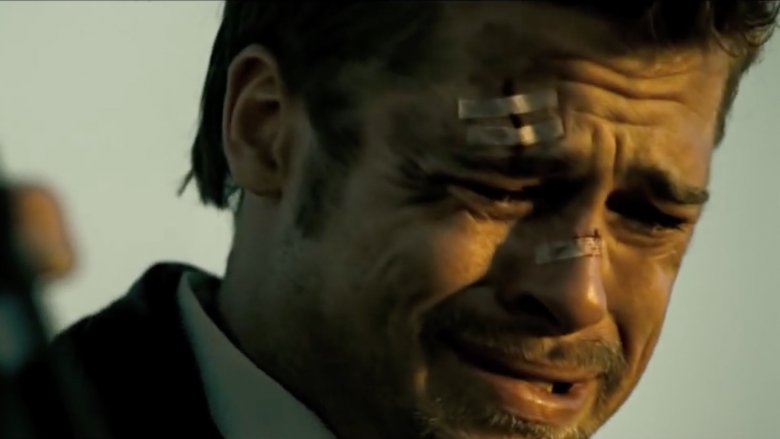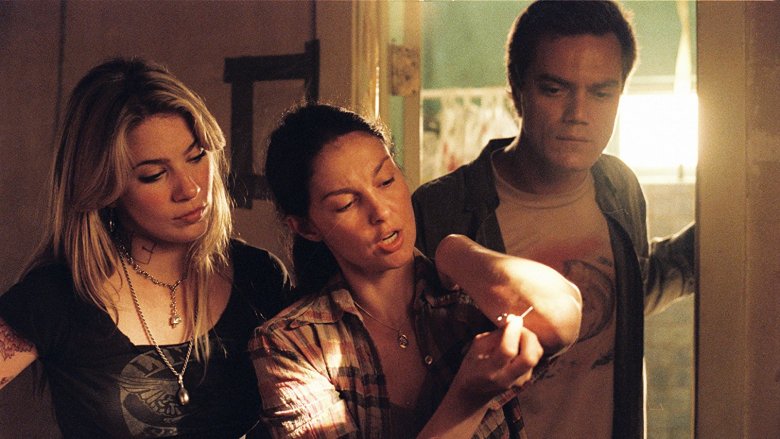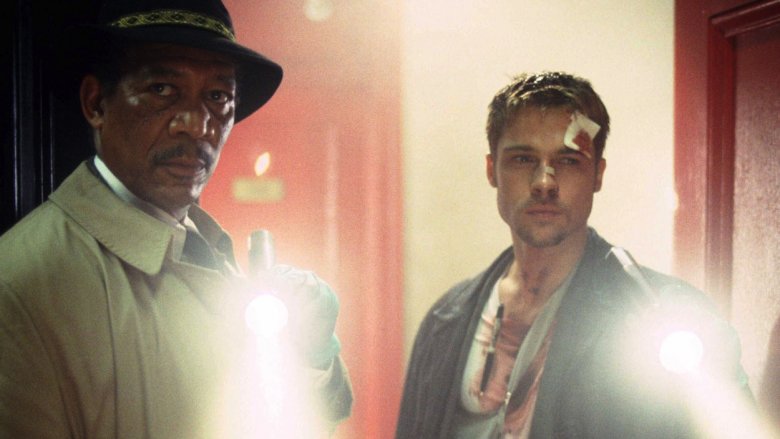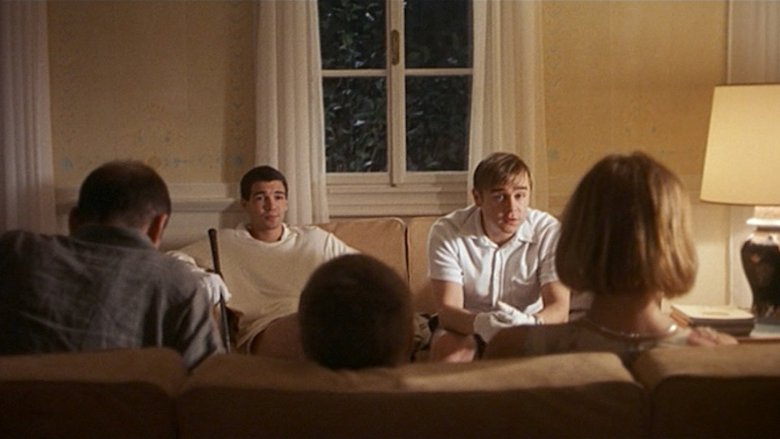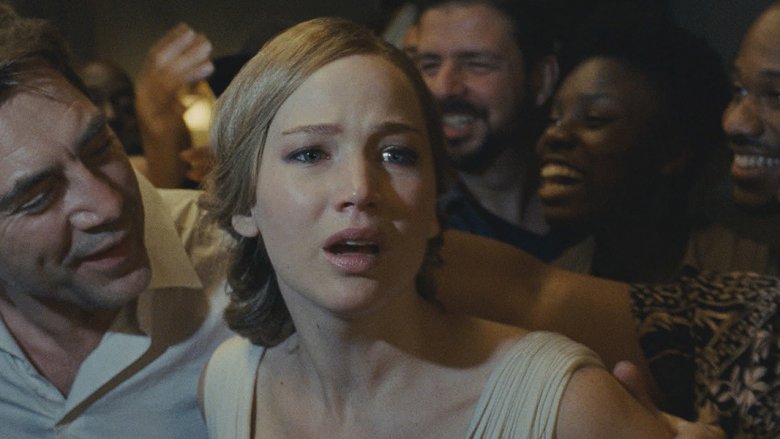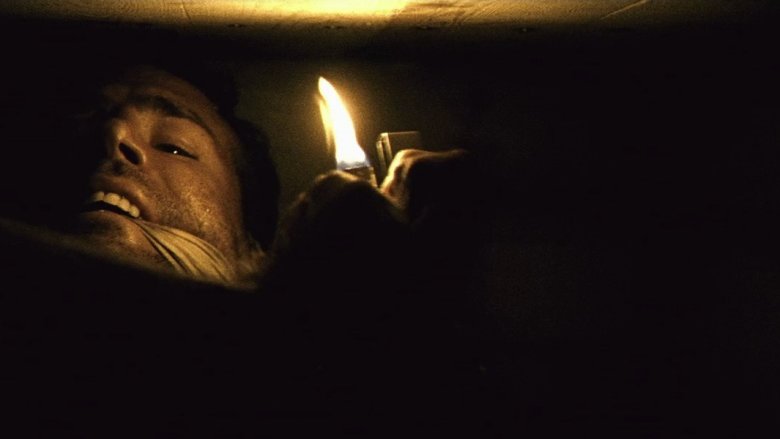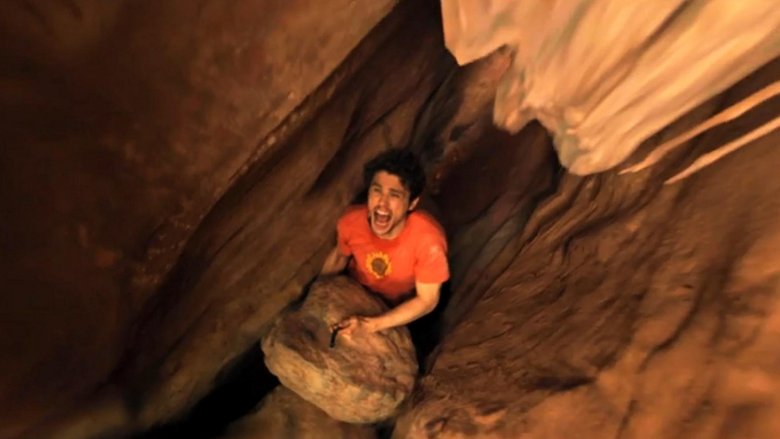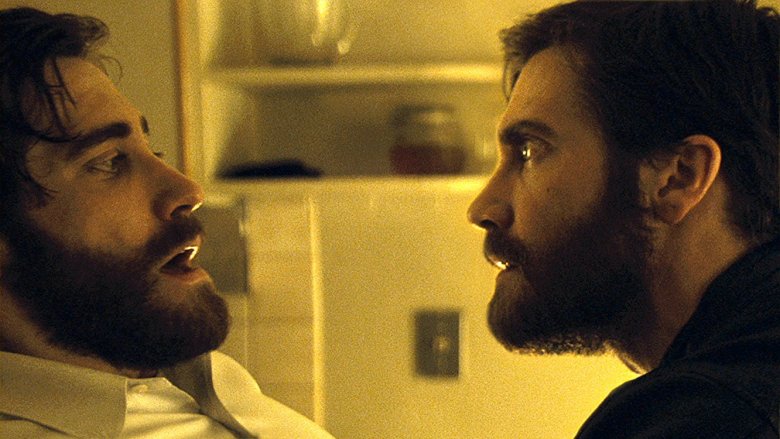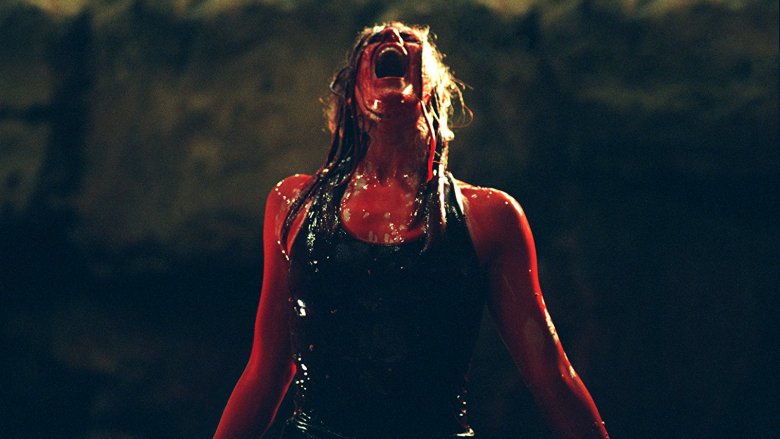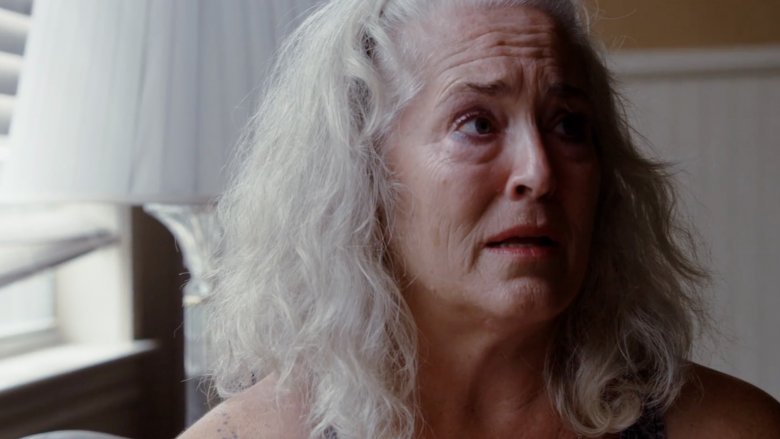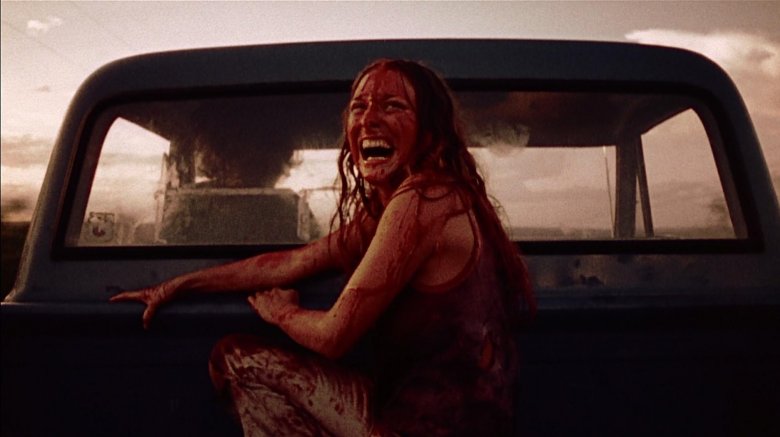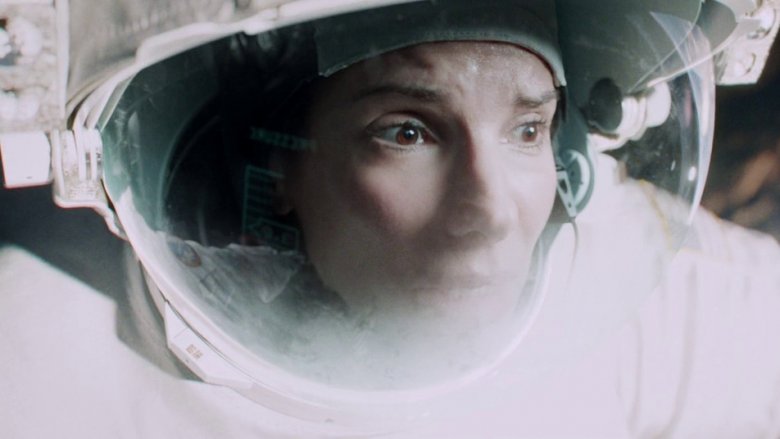The Most Stressful Movies You'll Still Want To Watch
For most people, going to the movies is a surefire form of stress relief — one that's specifically intended to distract us from the turmoil of our own lives for a least an hour or two. Of course, that strategy can occasionally backfire, because some films simply won't allow you to switch off your brain and check out of the world for even one single minute.
This isn't always a bad thing. In fact, some of our favorite films have relished in their intent to challenge our hearts, our minds, and indeed, our emotional stability. Sometimes they use savage beasts to set us on our heels; other times, it's a real-world monster or an unsettling scenario that put us on edge. Either way, some films just know how to push our stress buttons in thrilling, unexpected ways — and we end up loving them for it. These are the most stressful movies you'll still want to watch.
Bug (2006)
Remember that time William Friedkin directed one of the most unnerving films ever made and nobody seemed to care? It was 2006, the film was called Bug, and odds are you've never heard of it. That's a shame, because not only is Bug a penetrating, near-flawlessly executed psychological horror film, it features one of the finest performances of Ashley Judd's career and a breakout turn from the great Michael Shannon.
Still, Bug has flown mostly under radar for in the decade-plus since its release, mostly because it's hardly a feel-good affair. The bulk of the film is set inside a dingy hotel room and follows a damaged woman who seems to be on the verge of a fresh start after meeting a kindly war vet. Of course, that vet turns out to be one deeply unhinged individual, and what follows is a terrifying descent into a shared delusion driven by paranoia and desperation — one that's certain to raise your blood pressure a point or two or 10.
Friedkin keeps the action taut throughout, making the proceedings extra stressful by using expressionistic lighting to heighten moods, shooting his stars in invasive, unflattering close-ups, and featuring a handful of body horror scenes that would make David Cronenberg cringe. Bug is essentially the cinematic equivalent of poking at a raw nerve for a couple of hours, but it's well worth the pain — and you'll still want to watch.
Seven (1995)
When Seven made its way to theaters back in the fall of 1995, the world was simply not ready for its grisly morality or the relentlessly bleak storyline that accompanied that out-to-shock narrative, and it certainly wasn't prepared to see that narrative as a mirror for its moral and societal excesses. No, the world wasn't ready for Seven in 1995, but damn if we still didn't line up in troves to take a turn through David Fincher's symphony of sorrows.
That's a bit surprising considering Seven opens on a patently dour note and only gets more desolate, desperate, and above all stressful with every shocking moment that follows. Still, Seven is so meticulously constructed, obsessively executed, and skillfully acted (the film is a high point for both Brad Pitt and Morgan Freeman) that — even at its most gruesome — it's almost impossible not to want to watch it all unfold.
Whether it's because of Seven's obsessive nature, because we're all gluttons for punishment, or because we really just want to go to a diner and have a cup of coffee with Morgan Freeman, Fincher's feral fantasia of futility remains one of the most rewatchable movies ever made. Which also means that we might be missing the point.
Funny Games (1997 or 2007)
Michael Haneke is one of those filmmakers who delights in finding new ways to make audiences push the panic button. Screening Haneke's filmography is like taking a psychological stress test where you receive an electrical shock as both reward and punishment for every film you seen. Simply put, to love Hanke's work is to openly admit you've become addicted to the shock, and that's sort of the filmmaker's point.
However you feel about Haneke, the director unquestionably pushed his talent for stressing us out to the edge when he brought Funny Games to theaters. The film's twisted tale of two violent, well-educated sociopaths taking an affluent family hostage and torturing them for no apparent reason is enough to bring sweat to the brow of anyone with a pulse. Yet as Funny Games unfolds, Haneke ups the stress level by frequently implying the audience is complicit in the violence because we're the ones who want to watch it.
Each indictment comes almost as a dare to turn the film off. Whether you do or not, Haneke still takes pleasure in chastising viewers for witnessing even a second of it. So much, in fact, that when Hollywood started planning an English-language remake, Haneke himself signed on to direct, seemingly giddy at the thought of pushing these tender buttons again. To be clear, Funny Games is just as brutal and unforgiving in English as it was in German, and we still aren't sure why we felt so compelled to see it in both.
Mother! (2017)
Speaking of directors who like to push our buttons, let's have a round of applause for Mr. Darren Aronofsky! Those consider themselves devout Aronofskyites have come to expect the visionary filmmaker to push the boundaries of narrative, intellect, and quite often morality. Still, nothing in the director's riveting oeuvre could've prepared audiences for the boundary firebombing that was Aronofsky's 2017 offering, mother!
Set in a tranquil, secluded country home, the film follows a struggling poet (Javier Bardem) and his young wife (Jennifer Lawrence) as they try to write and remodel. That peaceful existence is disturbed with the arrival of unexpected guests — and once it's disturbed, things get out of hand rather quickly.
Understand that by "out of hand," what we actually mean is "completely bonkers in ways that no rational human being can possibly fathom." As mother! propels itself to its shocking but inevitable finale, the moments that lead us there come with a constant, feverish upping of the ante. As such, watching mother! is a decidedly stressful affair. It's an emotionally draining one as well, and that may have led to the film's box-office problems.
Still, if you're down to step inside mother!'s not-so-humble hearth, you might just find yourself anxiously connecting to this profound, insightful little film almost in spite of its toxic, taxing subject matter. But for heaven's sake if you come inside, don't sit on that sink, because it really isn't braced yet.
Buried (2010)
For much of his early career, the thought of taking Ryan Reynolds seriously as an actor just seemed laughable. Even has he tried to go straight with films like The Amityville Horror and Smokin' Aces, it was hard to forget the type of feckless doof he played in titles like Van Wilder. All of which is to say that many filmgoers' opinions of Reynolds as an actor were forever changed after seeing his nerve-wracking 2010 micro-budget thriller Buried.
What's so special about Buried, you ask? To begin with, the film takes place in a single location, with a single actor appearing onscreen. The location is a coffin buried somewhere in the Iraqi desert. Reynolds is the sole actor — and yes, he's buried inside the coffin. So begins the panic-inducing action of Buried.
Though panic-inducing might be understatement. If you're claustrophobic, sitting through Buried is a lot like subjecting yourself to a 95-minute anxiety attack. If you're not afraid of enclosed spaces, Buried is still a lot like subjecting yourself to a 95-minute anxiety attack. That being said, if you're daring enough to endure that claustrophobic terror, you'll be rewarded with a first-rate thriller with a few clever twists, some surprisingly insightful commentary about the state of "post-war" Iraq, and yes, an impressive dramatic performance from Ryan Reynolds, who doesn't snidely snicker or break the third wall even once.
127 Hours (2010)
There's often a fine line between not enough and way too much in movies. While most of the films on this list err on the side of too much in all the best ways, few pushed that boundary as far as 127 Hours. Based on the incredible true story of an impassioned mountain climber forced to cut off his own arm after getting trapped under a rock, the film is a harrowing study about one man's unshakeable will to live.
Yes, that story is as inspiring as you'd think, but it's also quite stressful — if not downright horrifying — to watch. When the moment finally comes to sever that trapped limb, director Danny Boyle doesn't pan away from the bloody, life-saving act, rather embracing the moment in a way that comes close to feeling exploitative of the real-life drama without quite tipping over into exploitation.
It's the sort of scene that makes you want to close your eyes and ears and curl up in a ball until it's over. It's not just stressful, it's absolutely agonizing, but even as it's happening you'll find yourself sort of wanting to watch the grisly action ... because the bulk of the film (featuring a career-best performance from James Franco) is spent fleshing out the man behind the story. Because we genuinely care about the life that's attached to that arm, the moment becomes more a celebration of life than a study in gore, even if it haunts your memory for months after you witness it.
Under the Skin (2013)
Sometimes it's hard to pinpoint exactly what it is about a movie that stresses you out. In the case of Jonathan Glazer's Under the Skin, it's a lot easier to figure out, because the answer is quite literally everything. The film's photography, music, acting, sound design, and editing all seem specifically designed with the single goal of keeping viewers on edge for the entirety of the film, and that's exactly what they do. The result is a challenging, deeply disturbing movie that you don't really watch as much as you experience.
Yes, it's often quite a stressful experience (the beach scene at Under the Skin's halfway point is so emotionally punishing it's almost physically painful to sit through), but it's also a profoundly engaging one. Under the Skin is so meticulous in its structural artifice, tonal shifts, and narrative ambition that the film virtually hypnotizes viewers into entering its oblique darkness as it examines complex topics of identity, extraterrestrial morality, and what it means to be human.
At the center of that exploration is the single weirdest (and possibly strongest) performance of Scarlett Johansson's career. The less said about that performance the better. Just know that, like Under the Skin itself, it works best if you know as little as possible going in. Know as well that if you're stressed out while experiencing Under The Skin, that just means it's working.
Enemy (2013)
Under the Skin wasn't the only 2013 film obsessed with questions about identity and the human condition. Denis Villeneuve's doppelgänger thriller Enemy actually treads in similar existentially deep waters that year — only Villeneuve took a distinctly more personal approach to the drama. Adapted from a novel by experimental Portuguese novelist José Saramago, Enemy follows the travails of an average man whose middling life is thrown into flux when he spots his exact double in a movie.
If that setup sounds slightly weird, well, you should know that Saramago is only getting warmed up. What follows is a stark, stressful, acutely observed study of identity and modern isolation. One that finds Jake Gyllenhaal in top form playing dual roles, and Denis Villeneuve beginning to tease the narrative daring that has become his trademark in the years since.
As far as Enemy's narrative goes, spiders figure prominently, which means there's a fair amount of arachnid angst involved in watching it. The film is also rife with metaphorical webs that, rather than try to untangle, Villeneuve seeks to reinforce, and to pull viewers further into the sticky, deadly center. That tactic remains true right up until the film's panic-inducing final moment. As such, Enemy is one of those rare movies that's stressful enough just to watch, and even more so after the credits have rolled and you're stuck trying to figure out what the hell just happened.
The Descent (2005)
These days, it's getting harder to make a great horror film that actually scares people. What makes Neil Marshall's The Descent so special is that it isn't just a great horror movie — it's actually three, and all of them will scare the hell out of you. The film opens as a sobering psychological drama and transforms into a claustrophobic caving nightmare before becoming a full-on, blood and guts creature feature.
That may sound like there's a bit too much going on in the film, and for most movies that would probably be true. Not so for The Descent, though. As Marshall's tale of six thrill-seeking friends setting out on a doomed caving expedition unfolds, the director never fails to find just the right moment to up the stakes and shift the narrative. He does it so skillfully that those disparate storylines bleed seamlessly into one unflinchingly brutal narrative that shocks the system while smashing your heart to bloody little bits.
Those of you who fear dark, enclosed spaces, dangerous emotional entanglements — and, um, blood-thirsty, cave-dwelling creatures — will find The Descent to be the very definition of stressful. However, if you can handle your own in the deep, dark recesses of both the Earth and the human heart, you're likely to find a horror movie paradise in The Descent's pitch-black purgatory.
Krisha (2016)
If The Descent feels like it's working with the holy trilogy of horror movie narratives, Trey Edward Shults delivered an equally unnerving trilogy for his austere psychological thriller, Krisha. Set in the cozy suburban household of a singularly fractured family, Shults' film takes one part complex family turmoil, adds a dash of overt holiday strife, and sprinkles that mixture with heavy dose of addiction drama to craft a pitch-perfect, pitch-black cinematic soufflé that had some critics hailing it as a "cinematic panic attack" upon release.
At the molten center of that stressful soufflé is a show-stopping from Krisha Fairchild, who portrays the titular character with equal parts fragility and outright menace. As Krisha opens, her story takes the look of a redemptive tale of recovery and forgiveness, but as the family's Thanksgiving Day progresses, it becomes clear that some wounds are slow to heal. The day quickly dissolves into a parade of caustic glances and biting words, and as it does, the anxiety relentlessly ratchets up to a pot-boiling fever pitch that you'll still somehow want to watch.
When it finally boils over, well, let's just say that their lives will never be the same. Yours may not either. Krisha doesn't just deliver on that "cinematic panic attack" label, it induces the sort of anxiety that's likely to leave you gasping for air once the credits roll. In a good way.
The Texas Chainsaw Massacre (1974)
Occasionally, a movie can be stressful not so much because of its content, but because of the way that content is presented. The Texas Chainsaw Massacre is undeniably disturbing strictly based on its content — the film is about a family of backwoods face-wearing cannibals who trap, torture, and try to murder/eat a group of unsuspecting teens, after all, and it's a bloody, brutal bit of business, to be certain. One that would have even staunchest of horror fans on the edge of their seats. It also happens to be very loosely based on a true story.
That last bit of info is the one that sets so many people off when they sit down to watch Tobe Hooper's macabre masterpiece, but it's the way Hooper presents the carnage that's stressful for most viewers. Shot on gritty,16 mm film stock and featuring mostly non-professional actors, the grisly action in The Texas Chainsaw Massacre often feels more like a documentary than a grotesque work of horror fiction.
That hyper-realistic feel had a galvanizing effect on audiences when Hooper's film hit theaters in 1974, and it continues to have that effect on audiences in the modern age — yet we still want to watch this polarizing piece of work, with many recognizing The Texas Chainsaw Massacre as the greatest horror film ever made.
Gravity (2013)
What's left to say about Alfonso Cuarón's Oscar-winning white-knuckler that hasn't already been said? Cuarón's stressful space-set thriller blows everything to hell within its first five minutes, and somehow manages to maintain the panic-stricken intensity throughout the 85 that follow.
Like the astronaut caught in the chaos (Sandra Bullock in an Oscar-nominated turn) the sheer, propulsive energy that drives Gravity leaves nary a second to think, or even to breathe. Rather, Gravity is a film that you're forced to react to on a visceral level. And you will react on a visceral level, because Cuarón uses every tool in his cinematic arsenal (sound, space, music, effects, editing, etc.) to draw you in and make you feel like you're caught in the middle of the action.
The crux of the film is that you also react to it on an emotional level. Credit a razor-sharp screenplay from Cuarón and his brother Jonás building enough detail into Bullock's astronaut to make us care whether or not she finds her way home, and an equally sharp performance from Bullock for fleshing out the character's unfinished edges enough to make her feel authentic. That mix helped make Gravity one of the most emotionally exhausting — and emotionally rewarding — films you'll ever want to watch.
